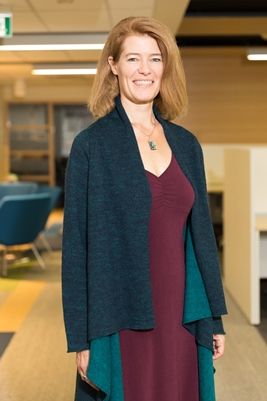
Influential victims’ advocate Jayne Stoyles now tackling human rights abuses with Amnesty International Canada
For Jayne Stoyles, Law’96 (Artsci’91), a passion for justice has always been undeniable, driving her to help victims of human rights violations in Canada and around the world. In September, this drive took her to a new role as Executive Director of Amnesty International Canada (English Branch), in an environment that suits her well.
“I’m an NGO person” she says, with understatement. “I just love the passion these people have and that it’s not about them – it’s about the issues. People are here at Amnesty International (AI) because they care.”
As Executive Director based in Ottawa, Stoyles shares leadership with AI’s Secretary General, Alex Neve, and puts Amnesty’s broad human rights agenda into play, focusing on issues particularly important from a Canadian perspective – currently corporate abuses (mining, oil), national security and mass surveillance, refugee protection, incarceration issues, and such Indigenous concerns as violence, missing women, and ecological abuse. Every day, Stoyles sets strategic priorities, evaluates campaign targets, and manages the 50-staff organization across the country.
Extensive experience brought her here. Prior to the AI appointment, Stoyles was the first Executive Director of the non-profit Canadian Centre for International Justice and founder of its social enterprise, the Philippe Kirsch Institute. She previously worked in New York City as Program Director for the NGO Coalition for the International Criminal Court – a network of 2,000 NGOs worldwide that was twice nominated for the Nobel Peace Prize during her tenure. She has taught international law at Carleton University, volunteered in Africa, Latin America, and northern Canada, is a lifetime Ashoka Canada Fellow, and was the 2010 winner of two prestigious human rights awards named for Walter S. Tarnopolsky and the Lord Reading Law Society.
Add to her many accolades a leading role in a $2.5-million, five-year grant from the Social Sciences and Humanities Research Council to work with academic researchers and other NGOs to improve justice for victims of international crimes. (Read more about this project.)
Stoyles’ calling came early, and Queen’s Law gave her the practical skills she needed. “Once you know what interests you, you have to start figuring out what your contribution will be,” she says.
Even as a student, she was exposed to the realities of this pursuit. During an internship in Honduras, she helped to bring a women’s rights perspective to the Honduran Criminal Code. When Stoyles encountered women who were facing security risks for being activists against the country’s repressive regimes in the 1970s and ’80s, she provided them with leadership training in human rights. “That made them harder to target as victims and witnesses,” she says.
This early exposure to people who put themselves and their families at risk to do human rights work was also a dramatic introduction to the impact of international law. “This chance to see what lawyers were doing on international issues completely changed my perspective on the importance of law,” she says. “I saw how firmly people believed in using law to stop human rights abuses.”
Today, she focuses on mostly big-picture, strategic work to help Amnesty implement its mandate, but, as a senior manager, she hasn’t lost her zeal for the issues on the ground. “I try to stay connected in a practical way,” she says. “I make sure I’m showing up to events and protests, meeting with activists and talking about the issues.”
Now two decades out of law school, Stoyles recently enjoyed the opportunity to reminisce with classmates at Homecoming and reflect on the diversity of their careers. “We often forget to stand back and really appreciate the opportunities we’ve been afforded and the contributions we’ve been able to make,” she says. “Looking back over 20 years, I realized that I really am doing what I went to law school to do.”
By Emily Lieffers